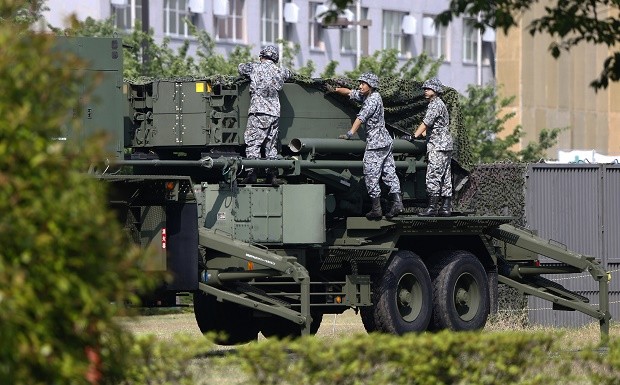
In this June 21, 2016 file photo, Japan Self-Defense Force members set up a PAC-3 Patriot missile unit deployed in case of a North Korean rocket launch at the Defense Ministry in Tokyo. Japan has called North Korea’s nuclear and missile development a “grave and imminent threat” to the region and international security, and criticized China’s increasingly assertive military action in its annual defense report. The report, approved Tuesday, Aug. 2, 2016, by the Cabinet, comes as Prime Minister Shinzo Abe’s government pushes for Japan to take on greater military roles abroad. AP FILE PHOTO
China firmly opposes and is strongly dissatisfied with a Japanese defense white paper that is “full of lies”, Defense Ministry spokesman Wu Qian said on Tuesday.
The report, approved by the Japanese Cabinet, plays up the South China Sea and East China Sea issues in a groundless manner and attempts to stir up trouble behind the scenes, from which Japan seeks to benefit, Wu said.
He accused Japan of unilaterally changing the status quo by illegitimately “purchasing” China’s Diaoyu Islands in 2012, enhancing military deployment targeting China, and passing a new security bill to end constitutional constraints on collective self-defense.
Japan is attempting to make excuses for its adjustment of military and security policy, military expansion and even amending the Constitution, which should trigger great concern among the international community, he added.
The 484-page white paper allocates several more pages to each country, including China and Russia, than the previous report.
READ: China rejects accusations in Japan defense report
It devotes more words to China than other regional powers such as Russia and the Democratic People’s Republic of Korea. It also describes China’s reclamation work in the South China Sea as a “provocation”.
“China is carrying out reforms to the People’s Liberation Army, which some see as being the largest in the country’s history,” the report says. “Recently, the reforms have taken place at a rapid pace.”
Lyu Yaodong, director of the Foreign Policy Researcher Center at the Chinese Academy of Social Sciences’ Institute of Japanese Studies, said Japan has exaggerated China’s maritime threat in recent years, and its real aim is to make excuses for its military expansion.
READ: Japan warns China of unintended conflict
The Asahi newspaper reported on Tuesday that Japanese Prime Minister Shinzo Abe will make 57-year-old Tomomi Inada, currently his ruling party’s policy chief, defense minister in a Cabinet reshuffle on Wednesday.
A close ally of Abe, she regularly visits Tokyo’s Yasukuni Shrine, which honors convicted war criminals.
Lyu said the reported nomination of Inada shows Abe’s hard-line stance on defense.
“It is expected that Inada will play hardball in Japan’s various territorial conflicts with surrounding countries including China,” he said.
Wang Ping, a senior researcher of Japanese studies at the Chinese Academy of Social Sciences, said Abe is trying to push Japan to become a military power, and nominating a right-wing politician is part of his efforts.